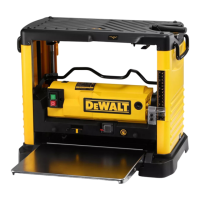ENGLISH
27
Fig. E5
27
32
Removing the Blades (Fig. A, E1–E4)
1. Unlock the head lock lever
2
(Fig. A).
2. Adjust the depth of cut to approx. 75 mm.
3. Remove the two hex screws
25
(Fig. E1) and carefully
remove the dust adaptor
13
and tool tray
12
(Fig. A)
to expose the blades.
4. Carefully rotate the cutterhead
30
(Fig. E4) until the first
blade becomes visible.
5. Lock the head lock lever
2
(Fig. A).
6. Loosen the seven blade clamping screws
26
,
28
(Fig. E2) using the wrench supplied.
7. Remove the blade from the cutterhead for
re-sharpening or replacement.
8. Press the cutterhead locking lever
29
(Fig. E3) and
slowly rotate the cutterhead until the other blade can
be removed.
Replacing the Blades (Fig. E2–E5)
1. Position the cutterhead
30
as shown in Figure E4.
2. Place the blade in the cutterhead and ensure that the
head of the height adjustment screw
27
(Fig. E4)
locates into the blade slot.
3. Loosen the seven screws
26
,
28
(Fig. E2) on the blade
clamp against the blade a little bit to allow the blade to
be adjusted for height.
4. Place the gauge
32
(Fig. E4) on the cutterhead as close
as possible to the height adjustment screw
27
while
still allowing movement of the hex key.
5. Turn one height adjustment screw
27
with the hex
key until the blade tip touches the gauge
32
(Fig. E5).
Repeat the procedure with the other height adjustment
screw. Check to ensure the blade height is even. Repeat
this procedure if needed.
6. Tighten the two end clamping screws
28
(Fig. E2) to
8.0 Nm.
7. Remove the gauge and tighten the five middle
clamping screws
26
(Fig. E2) to 8.0 Nm.
8. Press the cutterhead locking lever
29
(Fig. E3) and
slowly rotate the cutterhead until the other blade can
be replaced following the above procedure.
OPERATION
WARNING: Always observe the safety instructions
and applicable regulations.
WARNING: To reduce the risk of serious personal
injury, turn unit off and disconnect it from
power source before making any adjustments or
removing/installing attachments or accessories.
An accidental start-up can causeinjury.
Proper Hand Position (Fig. G)
WARNING: To reduce the risk of serious personal injury,
ALWAYS use proper hand position as shown.
WARNING: To reduce the risk of serious personal injury,
ALWAYS hold securely in anticipation of a sudden
reaction..
Fig. G
R
Switching On and Off (Fig. F1, F2)
The On/Off switch of your DW733 is equipped with a circuit
breaker. In case of motor overload, the power supply to the
motor will be cut off. If this happens, turn the machine off
and press the reset button
35
(Fig. F1).
• The workpiece should not be in contact with the
cutterhead when switching on.
To turn on, pull the on/off switch
1
up (Fig. F2). The tool
now works in continuous operation.
• Allow the motor to reach full speed before feeding
theworkpiece.
• Allow the blades to cut freely. Do not force.
To switch off, press the on/off switch
1
down.
To lock the machine off, insert a padlock into the hole
36
.
WARNING: Always turn off the tool when work is
finished and before unplugging.
Fig. F1
35

